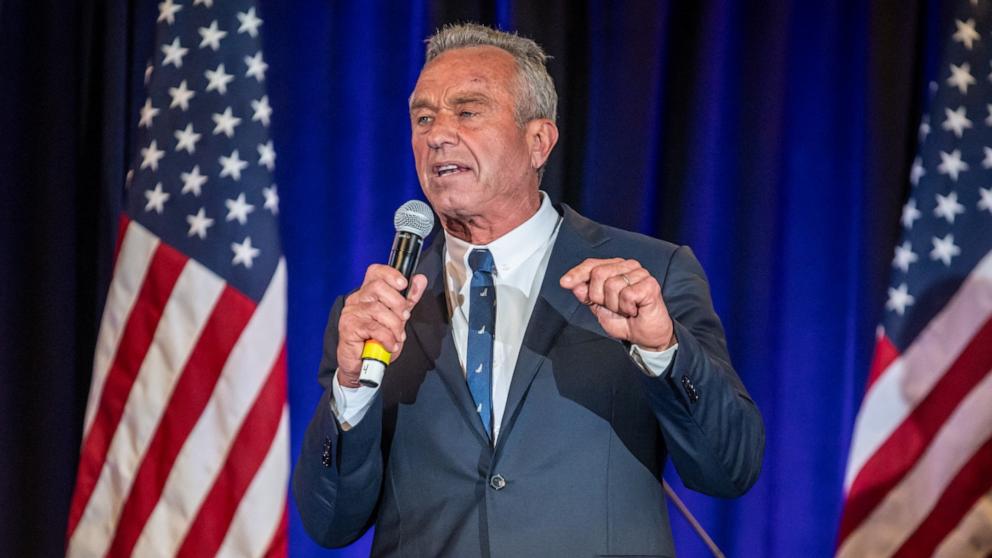Independent presidential candidate Robert F. Kennedy Jr. has previously denied joining the Libertarian Party, but with the party's national convention this weekend, there is speculation the two parties might work together to help Kennedy's efforts to get out the vote.
“I'm not going to run as a member of the Libertarian Party because we have no problem getting on the ballot ourselves,” Kennedy told ABC News in April.
But the Libertarian Party, whose national convention in Washington this weekend sees delegates vote on Sunday to decide who should be the party's presidential candidate, has openly considered the possibility of nominating Kennedy as its candidate.
If the party's delegates voted for Kennedy and he reconsidered his reluctance to join the party, he could appear on the ballot in enough states to theoretically win the 270 electoral votes needed to qualify in the debate states and even win the presidency.
ABC News has confirmed through state elections office websites and spokespeople that the Libertarian Party is on the ballot for the 2024 election in at least 37 states, including key battleground states like Pennsylvania and Arizona.
If a candidate wins in those 37 states, the party's candidate could theoretically receive up to 380 electoral votes.
The Libertarian Party has qualified to appear on the ballot in all 50 states and Washington, D.C., in past elections, including the 2020 election. Candidates and parties still have time to qualify for ballots in many states, but in others the deadline is months away or the filing period has not yet opened.
The 37 states the Libertarian Party has confirmed is more than double the 15 states the Kennedy campaign says it has now taken steps to place on the ballot: Utah, New Hampshire, Hawaii, Nevada, Michigan, North Carolina, Idaho, Nebraska, Iowa, California, Delaware, Ohio, Oklahoma, Texas and New Jersey.
Election officials in five of those states – Utah, Michigan, Hawaii, Delaware and Oklahoma – have so far confirmed to ABC News that Kennedy or his campaign's party, We the People, have qualified to appear on the ballot.
Kennedy also has voter access in three states – Georgia, Arizona and South Carolina – thanks to the super PAC American Values 2024, which supports Kennedy but cannot work directly with the campaign.
With these 18 states, Kennedy could theoretically win a total of 237 electoral votes.
Having a path to 270 electoral votes is one of the criteria needed to qualify for the June 27 presidential debate that will air on CNN.
There are other requirements, such as polling thresholds: For the upcoming debates, CNN and ABC News require candidates to receive at least 15% approval in four national polls within a certain time period as part of their respective debate eligibility requirements.
Kennedy may be close to meeting the polling threshold set by CNN: In a national poll released Thursday by Marquette University Law School, former presidents Joe Biden and Donald Trump were roughly tied in registered voters in a theoretical five-way race, but Kennedy received 17% support.
The Marquette University poll is likely the third poll that could help Kennedy win the election, after two polls conducted in April by CNN/SSRS and Quinnipiac University both had approval ratings of 15% or higher, both of which were also conducted within the time period published by CNN.
At least five Libertarian members who spoke to ABC News at the party's convention on Friday said Kennedy's nomination was unlikely.
“Let's be clear: nobody wants a politician like Robert F. Kennedy Jr. He's basically an establishment politician, a rehashed Democrat who hates the health care system,” said Chase Oliver, a Libertarian Party presidential candidate.
“I can tell you right now, if Robert Kennedy were to step on stage and say, 'I want to be the nominee,' there would be boos,” he added.
But on Thursday night, Libertarian Party Chair Angela McArdle did not rule out the possibility of Kennedy being nominated.
“That's still being talked about so we really don't know. I think we'll find out at the last moment,” McArdle told NewsNation.
ABC News' Will McDuffie, Brittany Shepherd, Isabella Murray and Sue-Lynn Kim and 538's Jeffrey Skelly contributed to this report.

